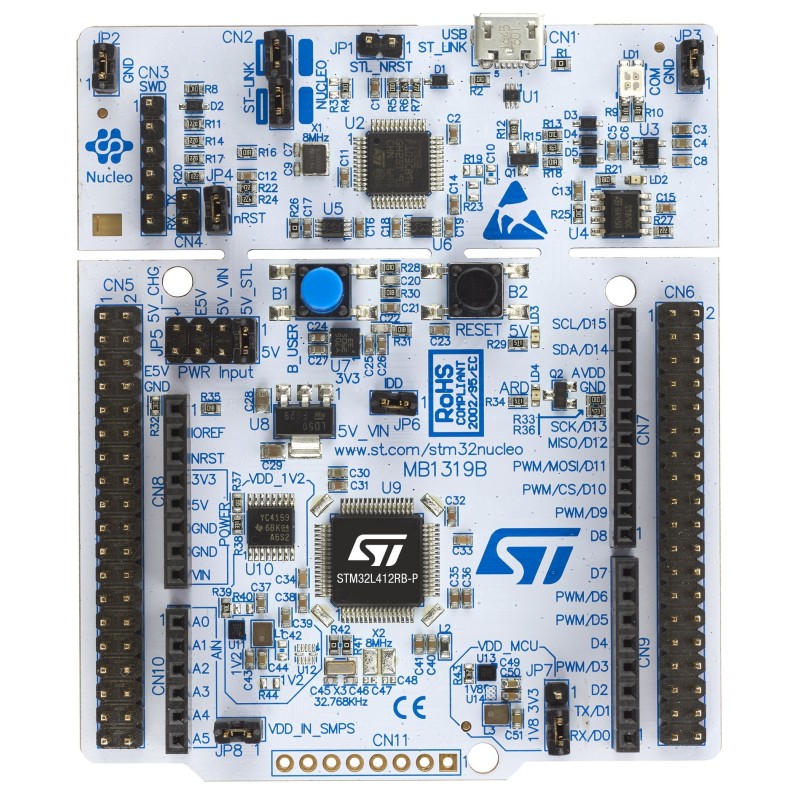




zł64.07 tax excl.
The STM32 Nucleo-64 boards provide an affordable and flexible way for users to try out new concepts and build prototypes with the STM32 microcontrollers, choosing from various combinations of performance, power consumption and features
Description
The STM32 Nucleo-64 boards provide an affordable and flexible way for users to try out new concepts and build prototypes with the STM32 microcontrollers, choosing from various combinations of performance, power consumption and features. For the compatible boards, the SMPS significantly reduces power consumption in Run mode.
The Arduino™ Uno V3 connectivity support and the ST morpho headers allow the easy expansion of the functionality of the STM32 Nucleo open development platform with a wide choice of specialized shields.
The STM32 Nucleo-64 board does not require any separate probe as it integrates the ST-LINK/V2-1 debugger and programmer.
The STM32 Nucleo-64 board comes with the STM32 comprehensive software HAL library together with various packaged software examples, as well as direct access to the Arm® Mbed™ online resources at http://mbed.org.
Features
Data sheet
Manufacturer BTC Korporacja sp. z o. o. Lwowska 5 05-120 Legionowo Poland sprzedaz@kamami.pl 22 767 36 20
Responsible person BTC Korporacja sp. z o. o. Lwowska 5 05-120 Legionowo Poland sprzedaz@kamami.pl 22 767 36 20
STM32 Nucleo-64 development board with STM32L476RGT6 MCU, supports Arduino and ST morpho connectivity
The STM32 Nucleo-32 boards provide an affordable and flexible way for users to try out new concepts and build prototypes with the STM32 microcontrollers, choosing from various combinations of performance, power consumption and features.
The STM32 Nucleo-64 boards provide an affordable and flexible way for users to try out new concepts and build prototypes with the STM32 microcontrollers, choosing from various combinations of performance, power consumption and features
The STM32 Nucleo-144 boards provide an affordable and flexible way for users to try out new concepts and build prototypes by choosing from the various combinations of performance and power consumption features, provided by the STM32 microcontroller. For the compatible boards, the SMPS significantly reduces power consumption in Run mode.
The STM32 Nucleo-144 boards provide an affordable and flexible way for users to try out new concepts and build prototypes by choosing from the various combinations of performance and power consumption features, provided by the STM32 microcontroller
The STM32 Nucleo-32 boards provide an affordable and flexible way for users to try out new concepts and build prototypes with the STM32 microcontrollers, choosing from various combinations of performance, power consumption and features
STM32 Nucleo-64 development board with STM32F303RET6 MCU, supports Arduino and ST morpho connectivity
Starter kit from the NUCLEO series equipped with the STM32F070RBT6 microcontroller (128 KB Flash, Cortex-M0), with a built-in programmer-debugger ST-Link/V2, equipped with connectors compatible with Arduino.
STM32 Nucleo-64 development board with STM32L476RGT6 MCU, supports Arduino and ST morpho connectivity
STM32 Nucleo-64 development board with STM32F446RET6 MCU, supports Arduino and ST morpho connectivity
STM32 Nucleo-64 development board with STM32F410RBT6 MCU, supports Arduino and ST morpho connectivity
STM32 Nucleo-64 development board with STM32L073RZT6 MCU, supports Arduino and ST morpho connectivity
The STM32 Nucleo-64 boards provide an affordable and flexible way for users to try out new concepts and build prototypes with the STM32 microcontrollers, choosing from various combinations of performance, power consumption and features
The P-NUCLEO-AZURE1 STM32 Nucleo pack is a hardware kit composed of the following boards: NUCLEO-L476RG, X-NUCLEO-IDW01M1, X- NUCLEO-IKS01A2 and X-NUCLEO-NFC01A1
No product available!
The STM32 Nucleo-64 boards provide an affordable and flexible way for users to try out new concepts and build prototypes with the STM32 microcontrollers, choosing from various combinations of performance, power consumption and features
The P-NUCLEO-IKA02A1 evaluation pack provides a reference design for various electrochemical sensors
The STM32 Nucleo pack for USB Type-C™ and Power Delivery (P-NUCLEO-USB001) is a development tool for learning and developing solutions based on USB Type-C™ and USB Power Delivery technologies
KA-NUCLEO-F411CE v2 is a development board based on the STM32F411CE microcontroller. It has a built-in programmer compatible with ST-Link / v2-1, it is possible to program and debug the microcontroller via the USB connector.
The STEVAL-FKI433V2 evaluation board is based on the S2-LP sub-1GHz ultra-low power low data-rate transceiver suitable for ISM bands and wireless M-Bus. The NUCLEO-L053R8 motherboard is equipped with an STM32L0 low power microcontroller to control the S2-LP
The STM32 Nucleo-64 boards provide an affordable and flexible way for users to try out new concepts and build prototypes with the STM32 microcontrollers, choosing from various combinations of performance, power consumption and features
The STM32 Nucleo pack is designed for USB Type-C™ and Power Delivery specifications
The STM32 Nucleo-64 boards provide an affordable and flexible way for users to try out new concepts and build prototypes with the STM32 microcontrollers, choosing from various combinations of performance, power consumption and features

The STM32 Nucleo-64 boards provide an affordable and flexible way for users to try out new concepts and build prototypes with the STM32 microcontrollers, choosing from various combinations of performance, power consumption and features
